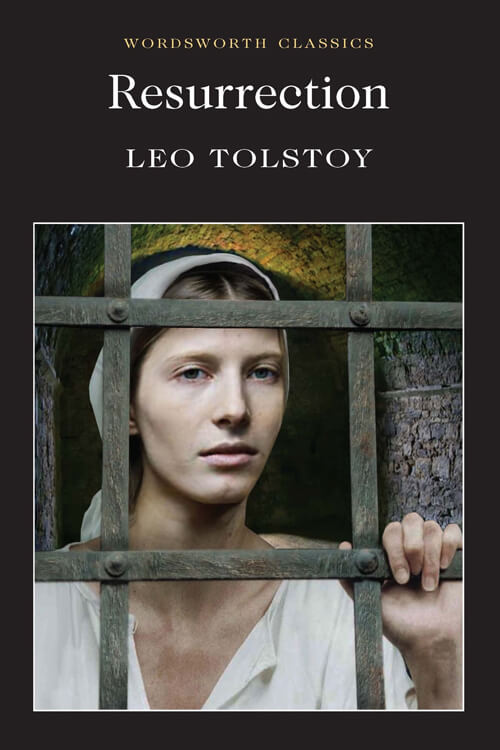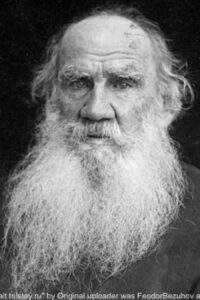
Resurrection
Though hundreds of thousands had done their very best to disfigure the small piece of land on which they were crowded together, by paying the ground with stones, scraping away every vestige of vegetation, cutting down the trees, turning away birds and beasts, and filling the air with the smoke of naphtha and coal, still spring was spring, even in the town.
The sun shone warm, the air was balmy; everywhere, where it did not get scraped away, the grass revived and sprang up between the paving-stones as well as on the narrow strips of lawn on the boulevards. The birches, the poplars, and the wild cherry unfolded their gummy and fragrant leaves, the limes were expanding their opening buds; crows, sparrows, and pigeons, filled with the joy of spring, were getting their nests ready; the flies were buzzing along the walls, warmed by the sunshine.
All were glad, the plants, the birds, the insects, and the children. But men, grown-up men, and women did not leave off cheating and tormenting themselves and each other. It was not this spring morning men thought sacred and worthy of consideration not the beauty of God’s world, given for a joy to all creatures, this beauty which inclines the heart to peace, to harmony, and to love, but only their own devices for enslaving one another.
Thus, in the prison office of the Government town, it was not the fact that men and animals had received the grace and gladness of spring that was considered sacred and important, but that a notice, numbered and with a superscription, had come the day before, ordering that on this 28th day of April, at 9 a.m., three prisoners at present detained in the prison, a man and two women (one of these women, as the chief criminal, to be conducted separately), had to appear at Court. So now, on the 28th of April, at 8 o’clock, a jailer and soon after him a woman warder with curly grey hair, dressed in a jacket with sleeves trimmed with gold, with a blue-edged belt round her waist, and having a look of suffering on her face, came into the corridor.
Read or download Book
Leo Tolstoy
Count Lev Nikolayevich Tolstoy (9 September [O.S. 28 August] 1828 – 20 November [O.S. 7 November] 1910), usually referred to in English as Leo Tolstoy, was a Russian writer regarded as one of the greatest authors of all time. He received nominations for the Nobel Prize in Literature every year from 1902 to 1906 and for the Nobel Peace Prize in 1901, 1902, and 1909.
Born to an aristocratic Russian family in 1828, Tolstoy’s notable works include War and Peace (1869) and Anna Karenina (1878), often cited as pinnacles of realist fiction. He first achieved literary acclaim in his twenties with his semi-autobiographical trilogy Childhood, Boyhood, and Youth (1852–1856) and Sevastopol Sketches (1855), based upon his experiences in the Crimean War. His fiction includes dozens of short stories, such as “After the Ball” (1911), and several novellas, such as The Death of Ivan Ilyich (1886), Family Happiness (1859), and Hadji Murad (1912). He also wrote plays and essays concerning philosophical, moral, and religious themes.
In the 1870s, Tolstoy experienced a profound moral crisis, followed by what he regarded as an equally profound spiritual awakening, as outlined in his non-fiction work Confession (1882). His literal interpretation of the ethical teachings of Jesus, centering on the Sermon on the Mount, caused him to become a fervent Christian anarchist and pacifist. His ideas on nonviolent resistance, expressed in such works as The Kingdom of God Is Within You (1894), profoundly impacted such pivotal 20th-century figures as Mahatma Gandhi, Martin Luther King Jr., and Ludwig Wittgenstein. He also became a dedicated advocate of Georgism, the economic philosophy of Henry George, which he incorporated into his writing, particularly in his novel Resurrection (1899).
Origins
The Tolstoys were a well-known family of old Russian nobility who traced their ancestry to a mythical nobleman named Indris described by Pyotr Tolstoy as arriving “from Nemec, from the lands of Caesar” to Chernihiv in 1353 along with his two sons Litvinos (or Litvonis) and Zimonten (or Zigmont) and a druzhina of 3000 people. While the word “Nemec” has been long used to describe Germans only, at that time it was applied to any foreigner who did not speak Russian (from the word nemoy meaning mute). Indris was then converted to Eastern Orthodoxy, under the name of Leonty, and his sons Konstantin and Feodor. Konstantin’s grandson Andrei Kharitonovich was nicknamed Tolstoy (translated as fat) by Vasily II of Moscow after he moved from Chernihiv to Moscow.
Because of the pagan names and the fact that Chernihiv at the time was ruled by Demetrius I Starshy, some researchers concluded that they were Lithuanians who arrived from the Grand Duchy of Lithuania. At the same time, no mention of Indris was ever found in the 14th-to-16th-century documents, while the Chernihiv Chronicles used by Pyotr Tolstoy as a reference was lost. The first documented members of the Tolstoy family also lived during the 17th century, thus Pyotr Tolstoy himself is generally considered the founder of the noble house, being granted the title of count by Peter the Great.






